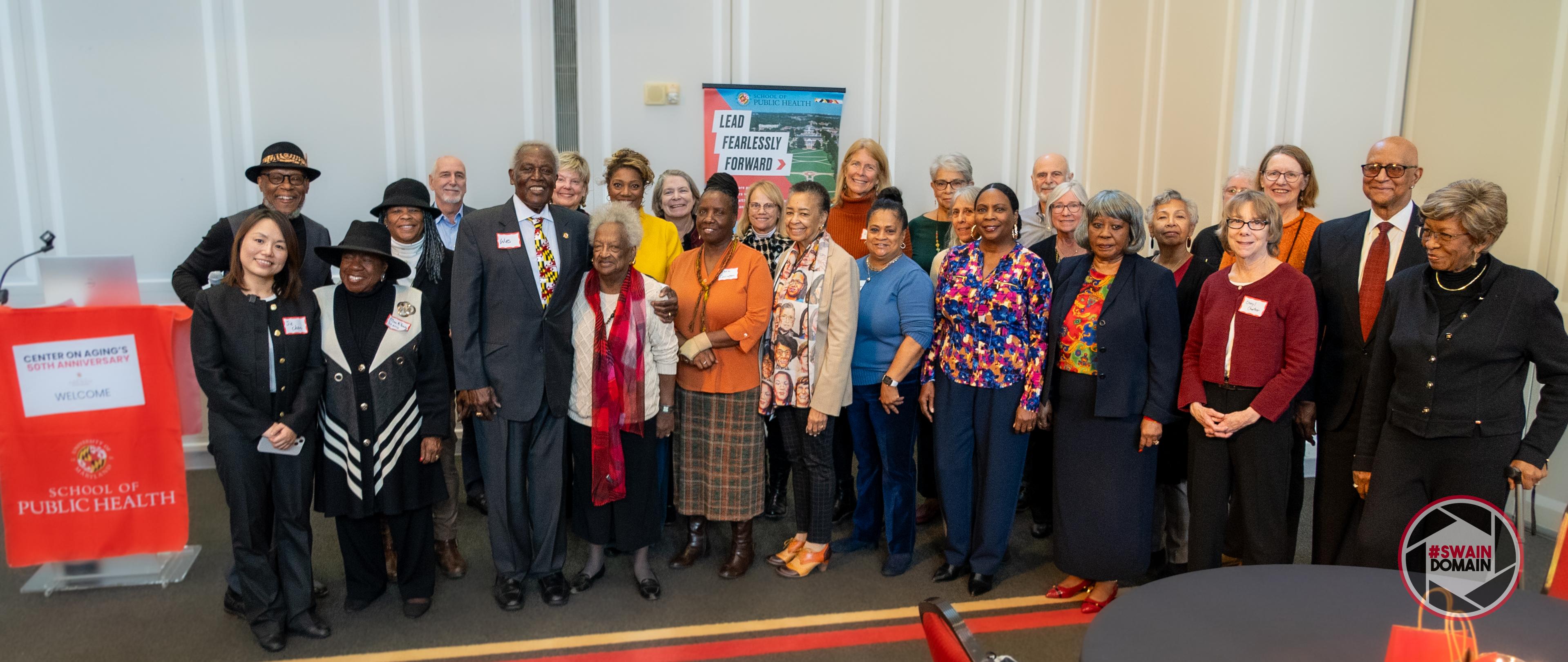Current and Recent Research
We examine the impacts of health policies and social determinants of health on health expenditure, quality of care, and health outcomes among older adults, particularly those with ADRD, cancer, and behavioral health issues. Learn More (link to the project page related to this topic and explore our National Institutes of Health-funded research grants in this area.

The effect of childhood environments on adult health and mortality
The lack of large and representative data with information on both individual childhood experiences and adult health status by race limits studies on the childhood origins of health and health disparities. The project will overcome existing data limitations via historical records linkages and fill vital knowledge gaps regarding the impacts of childhood environments on longevity and racial disparities. LEARN MORE.
The Principal Investigator is Dr. Dahai Yue.

The Impact Of Hospital-Based Health Information Technology on Health Care Quality and Equity Among Patients with ADRD
We propose to evaluate the impact of hospital-HIT on health care quality (i.e., reduce readmission, preventable ED visits, and preventable hospitalizations) (Aim 1), estimate the extent to which hospital-HIT has reduced racial and ethnic disparities of health care quality and expenditures for the aging population with ADRD (Aim 2); and estimate the extent to which hospital-HIT has impacted health outcomes and quality during the pandemic (Aim 3). LEARN MORE.
The Principal Investigator is Dr. Jie Chen.

The Impact of Medicare on Individual Longevity: Evidence from Medicare Introduction Using Big Data
Little is known about the lifetime effect of Medicare on individual longevity and whether it varies across socioeconomic groups. In this project, we will evaluate the impact of Medicare’s introduction on completed longevity using new data and a novel empirical approach. Results from this study will contribute to scientific knowledge that will inform the design of health insurance programs in the US. LEARN MORE.
The Principal Investigator is Dr. Dahai Yue.

Multimorbidity Trajectories, Psychosocial Resilience and Stress, and Risk of Dementia and Poor Cognitive Functioning
This project uses data from the Health Retirement Study to examine multimorbidity and the role of psychosocial resilience and stressors in either enhancing or attenuating dementia risk and poor cognitive functioning. The results from this study will inform the design of interventions and preventive strategies targeting psychosocial factors among populations at greatest risk and improve precision in stratifying risk for poor cognitive function to delay the development and progression of Alzheimer's Disease. LEARN MORE.
The Principal Investigator is Dr. Kellee White Whilby.

Effect of Hospital and Community Care Coordination on Health Care Access, Quality and Equity among Individuals with Risk Factors or Diagnosis of ADRD
We aim to identify hospital-community care coordination practices that can improve quality of care, reduce health care costs, and reduce racial and ethnic disparities (Aim 1); determine the extent to which ACO models can promote care coordination practices and reduce disparities among Medicare beneficiaries with ADRD and beneficiaries who are at an increased risk for ADRD (Aim 2); and estimate the impact of care coordination practices and ACO models on health care quality and disparities reduction among HUD-assisted populations with ADRD and populations who are at an increased risk for ADRD (Aim 3). LEARN MORE.
The Principal Investigator is Dr. Jie Chen.

Understanding Alcohol Use and Alcohol-Related Care among Older Adults with Heart Failure
The specific aims of this project are to use rigorous causal inference and machine learning methods to 1) estimate the relationships of alcohol use and misuse with HF self-management behaviors for the first time and 2) produce less biased and more generalizable estimates of the relationships between alcohol use and misuse and adverse HF outcomes, which are currently poorly understood. In addition, we will 3) characterize the quantity and sources (venue, provider specialty, length of patient-provider relationship, provider participation in Accountable Care Organizations) of documented alcohol-related care currently received by older adults with HF. LEARN MORE.
The Principal Investigator is Dr. Aryn Phillips.
Resources
Centers for Medicare and Medicaid Services Data (CMS) Link
- Master Beneficiary Summary File (2014 – 2021)
- MedPar File
- Inpatient claims
- Outpatient claims
- Home Health claims
- Skilled Nursing Facility claims
- Carrier claims
- Hospice claims
- Part D Event data (2020-2021)
- Part C Medicare Advantage Encounter Data (2019 - 2020)
- T-MSIS Analytic Files (TAF) (2020)
- MCAHPS MA_PDP - Survey Data
- ACO Shared Savings - Beneficiary-level file
- ACO Shared Savings - Provider file
- CAHPS Fee for Service - Survey Data
- MCAHPS MA_PDP - Survey Data
Projects
Legacy Leadership Institute on Public Policy
Purpose
The Legacy Leadership Institute on Public Policy, based in the University of Maryland School of Public Health, is designed to provide residents aged 50+ with new careers as Legacy Service Leaders during retirement. Participants will receive training and work with legislative leaders to help address the challenges facing the state of Maryland.
Goals
- To allow Maryland residents age 50+ to contribute meaningfully to the community as they transition from the paid labor force into volunteer positions during their retirement years
- To prepare Legacy Leaders to provide additional assistance and supplement the work of elected officials and nonprofit agency staff in addressing policy issues and advancing public programs
Application Process
Visit the Legacy Leadership Institute on Public Policy site for information on how to apply.
For more information please, contact Dr. Wesley Queen (wqueen@umd.edu)
Retired Seniors and Volunteering Program International (RSVPI)
Mission
The mission of RSVP International is to develop, support, and enhance volunteer programs for individuals 50+ through a network of global partnerships that create sustained civic engagement opportunities, meaningful roles, and purposeful social networks to address local community needs.
History and Background Information
RSVP International was founded in 1984 by Arthur Garson and Patricia (Bunny) Garson. They envisioned a better world by engaging older citizens whose skills and life experiences could be used to create culturally relevant and indigenous volunteer programs to meet identified social and human needs. Today, their son, Thomas A. Garson, is RSVP-I Program Advisor in the Center on Aging.
Transition Plan for RSVP International
Because of changes in Center on Aging personnel, RSVPI is currently working on a Transition Plan which builds on the interests and activities of current faculty and students and provides a platform for sustaining and expanding the RSVP International commitment to senior service globally. The Transition Plan for RSVP International comes at an opportune time given the new opportunities and directions at the University of Maryland School of Public Health. RSVP International fits well into the University of Maryland School of Public Health 2018-2023 Strategic Plan which encourages a greater focus on global health. In addition, we will work at making RSVP International an integral part of the re-imaging of the Center on Aging.
The first phase of the plan focuses on developing a roadmap for moving forward over a two-year period. It includes:
- Organizing one seminar a year in the Center on Aging with a researcher presenting on a topic relevant to RSVP International.
- Reviewing interests and research and service capacity of current faculty, students and staff to identify matches with the RSVP International goals and global objectives.
- Raising awareness among current faculty, students, and staff of the RSVP International program, goals, and global objectives.
- Involving student participation in RSVP International engagement and extending focus to local volunteer programs for 50+ individuals
For more information, please contact Dr. Luisa Franzini (franzini@umd.edu)
Completed Research
As the cost of long-term care continues to rise, policymakers and others are seeking new ways to control costs while maintaining or increasing customer satisfaction. Currently, there is increasing interest among the aging and disability communities in models of consumer-directed health care. Among them is "cash and counseling," in which cash allowances, coupled with information services, are paid directly to disabled persons allowing them to arrange and purchase the services they feel best meet their needs. The Cash and Counseling Program consisted of demonstrations and evaluations of programs in three states: Arkansas, Florida, and New Jersey. The purpose of the program was to evaluate, using a true experimental design, the impact of permitting consumers to take on the responsibility of managing a cash allowance and arranging their own services.
The program was sponsored by The Robert Wood Johnson Foundation and the U.S. Department of Health and Human Services.
Boston College, National Program Office
Kevin Mahoney, Ph.D., National Project Director
Kristin Simone, M.M., Deputy Project Director
Lori Simon-Rusinowitz, PhD, Director of Research
The Cash and Counseling Demonstration and Evaluation (CCDE) is a policy-driven study of a consumer-directed approach to personal assistance services (PAS) for elders and younger adults with disabilities. Funded by the U.S. Department of Health and Human Services (DHHS) and the Robert Wood Johnson Foundation (RWJF), this rigorous social experiment tests the use of a cash benefit to enhance Medicaid consumers' ability to design PAS services that best meet their needs (while maintaining overall program budget neutrality). Using their cash benefit, consumers choose who provides these very personal and essential services (help with bathing, eating, dressing, etc.), as well as when and how they are provided. For example, consumers may hire a friend or relative, who knows their preferences, to help them on evenings or weekends when agency services may be unavailable. Consumers are also able to use their benefit to buy other services that may increase their independence (e.g. transportation, home modifications, assistive devices). Counseling and bookkeeping are offered to help consumers manage their services.
Working in partnership with federal agencies such as the Health Care Financing Administration (HCFA) and Social Security Administration, this true public-private project compares the cash option with traditional, agency-delivered services. The three demonstration states -- Arkansas, Florida, and New Jersey -- are offering the cash option to elders (over 65 years old) and adults with disabilities (ages 18-64). Children with developmental disabilities are also included in Florida. Arkansas and New Jersey are cashing out services from the Medicaid optional personal care benefit, while Florida is including services from the state's Home and Community -Based Services waiver.
The evaluation, conducted by Mathematica Policy Research, randomly assigns consumers interested in the cash option to treatment and control groups. This comprehensive evaluation focuses on consumers' service utilization and preferences, quality of care, and service costs as well as issues related to paid and informal workers. A process evaluation also documents how the cash option was implemented in each state and identifies environmental factors that can explain program effects. Project counselors will also provide feedback on their experience with cash-option consumers. Finally, a qualitative study in each demonstration state will provide an in-depth view of how the cash option team (consumer/representative, worker, and counselor) work together.
Phase I of this national demonstration began in October, 1995 with selection of the evaluation contractor and demonstration states. Phase II (October 1996-November 1998) included background research (focus groups and telephone surveys) to determine consumers' preferences for a cash option or traditional services, completion of a HCFA Medicaid 1115 waiver application, coordination with other federal agencies regarding the impact of the cash benefit on eligibility for other major programs, and development of demonstration state infrastructures for outreach, counseling, and fiscal intermediary services. Phase III began in December, 1998 when Arkansas enrolled the first cash-option consumers. New Jersey began enrolling consumers in November 1999 while Florida began enrollment in May 2000. Each state will have open enrollment for at least one year and consumers will be followed for one year (with a promise of two years of cash). Interim project reports will be developed during program implementation, and the final report will be completed one year and three months after data collection is completed.
The CCDE promises to expand our knowledge about the use of cash benefits -- an ultimate form of consumer-directed PAS -- and inform program administrators and policymakers about future direction for state and national long-term care policies. We look forward to sharing study findings.
For more information, please contact Dr. Lori Simon-Rusinowitz (lasr@umd.edu)
While Medicare Advantage (MA) enrolls nearly one-third of Medicare beneficiaries, there has been little research on what types of high-need, high-cost beneficiaries enroll in MA plans and what are the characteristics of these segments. In this project, identify the segments of high-need, high-cost population in the MA program using a large survey of MA beneficiaries, the Medicare Health Outcomes Survey to provide new evidence on the types of high-need, high-cost segments in Medicare Advantage and their unique characteristics. Through this study, the authors published a paper in the Journal of the American Geriatrics Society examining whether neighborhood context moderates the relationship between multiple chronic conditions (MCCs) and function in Medicare Advantage (MA) beneficiaries. The Principal Investigator is Dr. Eva DuGoff.
Read the study on Linking Neighborhood Context and Health in Community‐Dwelling Older Adults in the Medicare Advantage Program
Dr. Carson Smith and his colleagues will test the potential for exercise training, compared to flexibility exercise conditioning, to effect biomarkers of neural network function in healthy carriers of APOE-e4, an Alzheimer's risk gene. They will also look at whether exercise improves the efficiency of memory neural networks and memory performance. These may provide a low-cost, high-impact approach for Alzheimer’s Disease prevention, and improve the quality of life of older adults at increased genetic risk for Alzheimer’s Disease. Exercise is a low-cost, low-side effect intervention that improves cardiovascular and metabolic health, both of which are significant co-morbidities of dementia, the project narrative reads. If it is shown to be effective in attenuating Alzheimer’s Disease progression, exercise training has the potential to have a tremendous positive impact on public health.
This research builds on Dr. Smith’s previous work in the area of exercise and brain health. Published in Frontiers in Aging Neuroscience in August 2016, that work suggests that improvements in brain blood flow to a person's brain because of exercise will diminish if that person stops training. Researchers examined cerebral blood flow in healthy, physically fit older adults (ages 50-80 years) before and after a 10-day period during which they stopped all exercise. Using MRI brain imaging techniques, they found a significant decrease in blood flow to several brain regions, including the hippocampus, after they stopped their exercise routines.
For more information please contact Dr. Carson Smith (carson@umd.edu)
The research in this R21 Exploratory/Developmental Research Grant application is designed to determine the effects of a novel neuromuscular and exercise rehabilitation program on angiogenesis, physical function, and glucose metabolism in older patients with peripheral artery disease (PAD) who are at high risk for frailty and loss of functional independence. Further, it will determine skeletal muscle mechanisms by which these interventions may improve blood flow and muscle perfusion to enhance function and metabolism in these older patients. This is especially relevant to the aging population as the identification of efficacious rehabilitation programs could significantly alter the clinical management of the 20% of older adults with PAD, with the ultimate goal of reducing the rates of surgical intervention, morbidity and mortality in older adults. The Principal Investigator is Dr. Steven Prior.
The five-county Mid-Shore region of Maryland, comprised of Caroline, Dorchester, Kent, Queen Anne’s and Talbot counties, faces unique health challenges similar to many rural communities. When compared to Maryland overall, the population of the Mid-Shore counties presents with greater challenges: a higher percentage are living in poverty, a higher percentage are older adults, and the populations have greater mortality rates overall and for conditions such as heart disease, cancer, unintentional injuries and drug overdose.
Further, barriers related to transportation, isolation, access to healthy foods and education are reflected in higher rates of diabetes, obesity and behavioral/mental health needs. These factors, together with limited access to primary and specialty care, contribute to higher use by Mid-Shore residents of emergency department visits and hospital inpatient stays that may have been prevented with early interventions. To help better meet health care needs in the Mid-Shore region and provide recommendations that could be applied to other Maryland rural areas, the Maryland Health Care Commission (MHCC) and the Department of Health established a workgroup on rural health care delivery to oversee a study, hold public hearings and recommend policy options.
At MHCC’s request, the University of Maryland School of Public Health and the Walsh Center for Rural Health Analysis at NORC at the University of Chicago partnered to conduct the study and to work in collaboration with the workgroup. The workgroup developed recommendations based on the study findings that would support better health and well-being of Mid-Shore residents and potentially other rural Maryland communities as well. The Principal Investigator is Dr. Luisa Franzini.
Read the November 2017 report on Health Matters: Navigating and Enhanced Rural Model for Maryland.


